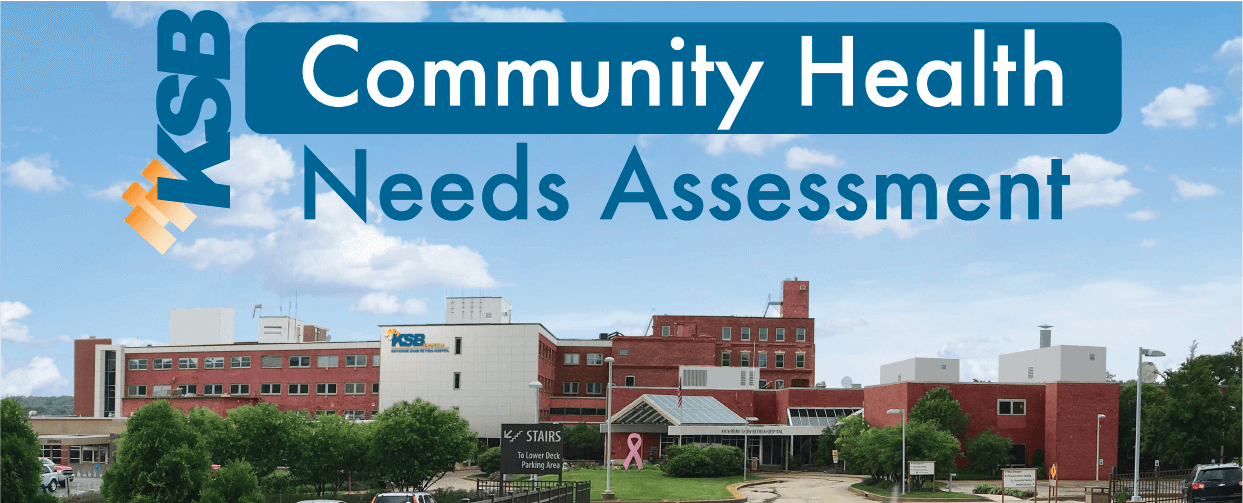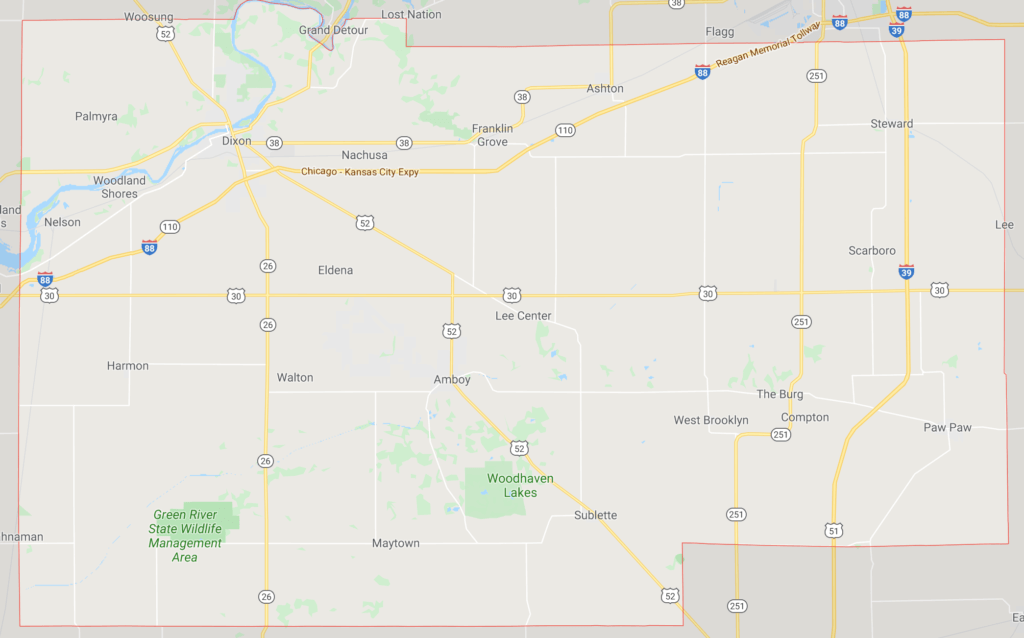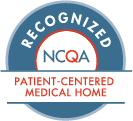
Introduction
At Katherine Shaw Bethea Hospital, our mission is to restore, maintain, and enhance health by providing superior care now and in the future. Since Katherine Shaw Bethea Hospital was founded in 1897 by Solomon Hicks Bethea in memory of his late wife, we have been an integral and highly visible part of the Dixon community.
The Community Health Needs Assessment is a process we undertake every three years in compliance with federal requirements. But it is more than that. It is also a chance for us to listen to the people we serve and challenge ourselves to better understand and respond to their health needs. Sometimes we hear similar concerns or challenges that have been facing our community—and communities across America—for years. Sometimes we hear new questions or issues that have just come up. Altogether, the CHNA process helps us listen to our community and plan a response to better meet their needs.
Definition of Community & Demographics
For this Community Health Needs Assessment, we define our community as Lee County, Illinois. KSB Hospital is located in Dixon, Illinois, which is the county seat of Lee County. In addition to the hospital, KSB operates Commerce Towers Clinic, Town Square Centre Clinic, Edwards Clinic, Lawless Eye & Vision Center, KSB/Physicians Immediate Care, a physical therapy clinic, and the 5th/3rd Building in Dixon, as well as the Amboy Clinic and Ashton Clinic in Lee County. KSB also has clinic locations in Oregon and Polo in Ogle County. We define our Primary Service Area as 15 ZIP Codes in Lee and Ogle Counties, with a total population of approximately 45,000—of which two-thirds are in Lee County, led by Dixon’s 61021 ZIP Code with about 22,000 people. Because of the significant population share in Dixon and Lee County, and because of how data is commonly collected and reported, we chose to identify Lee County as our community for this CHNA.

Lee County has a population of 34,049, according to the U.S. Census Bureau 2021 estimate. Looking at Lee County population by age shows a notably higher percentage of the population over age 65 than the state or national averages—with 20.5% in Lee County versus 16.6% in Illinois and 16.0% in the United States. As a corollary, the population age 17 and under in Lee County, 19.7%, is lower than the state, 22.1%, or national, 22.1%, levels. The median age in Lee County is 43.5, compared to 38.3 in Illinois, and 38.3 in the United States.
Lee County also has less racial diversity than Illinois or United States totals. Lee County is comprised of 90.6% White, 6.4% Black, and no other race above 1%. Additionally, 7.2% of Lee County residents are Hispanic or Latino.
Existing Health Care Facilities & Resources
Lee County residents are served primarily by KSB Hospital and the KSB Medical Group for medical needs. KSB Hospital is an 80-bed acute care hospital offering emergency medicine, labor & delivery, inpatient psychiatry, multi-disciplinary surgery, and a comprehensive set of diagnostic imaging and laboratory services. The KSB Medical Group is a multi-specialty physician practice offering services in ten locations across six local communities in Lee and Ogle Counties. In addition to the physician practices, KSB also offers outpatient and clinic services in physical therapy, behavioral health, wound care, home care, respiratory therapy and sleep lab, and wellness, among others.
The mental health needs of Lee County residents are also served by Sinnissippi Centers, a comprehensive provider of behavioral health and substance abuse counseling services. There is also a Recovery Home, Sauk Valley Voices of Recovery that lends support to the recovering community. Residents can receive urgent medical care at KSB/Physician’s Immediate Care. Many providers offer dental and orthodontic services, and several local stores offer pharmacy and optometry services.
Obtaining the Data
Data for this CHNA was obtained from a variety of sources, both in person and online. Demographic data and health indicators were obtained on from the Lee County Illinois Youth Survey 2020; CDC WONDER; Illinois Health and Hospital Association, COMP data; Illinois Behavioral Risk Survey 2020; National Center for Health Statistics; and Illinois Secretary of State. Population data was obtained from the U.S. Census Bureau website and their American Community Survey tool.
KSB Hospital partnered with the Lee County Health Department to collect data for the CHNA. Lee County Health Department is completing their IPLAN for 2022. This was a great collaboration since the CHNA and IPLAN are very similar assessments for Lee County and our service area.
A CHNA survey was opened to the public in June 2022 and responses were solicited through social media accounts. We received 396 responses. 5 focus groups were also conducted by Lee County Health Department.
Data from these reports, interviews, and surveys were shared with the KSB Wellness Steering Committee to solicit input and stimulate discussion of community health needs among a committee that meets throughout the year to discuss wellness initiatives.
Health Needs of the Community
The surveys, interviews, census information, demographics, and health indicator data—combined with input from clinicians and organizational leaders—indicate the following to be the top health needs of the community: behavioral health, obesity and physical inactivity, access to care and transportation, food insecurity, and tobacco and e-cigarette use.
To identify and prioritize the needs, we used the Hanlon Method of health problem priority setting, and the PEARL test for feasibility. The Hanlon Method measures the size of the health problem, the impact of the health problem, and the effectiveness of intervention. The scoring identified the following three key priorities which will become the focus of implementation plans from KSB Hospital during the life of this Community Health Needs Assessment:
- Behavioral Health (Focus on Anxiety and Depression)
- Heart Disease
- Obesity & Physical Inactivity
Priorities Not Selected
In the 2019 CHNA, we identified Access to care/Transportation as a key priority and enacted an implementation plan to meet the need. This plan included KSB partnering with the Lee Ogle Transportation Service (LOTS) and providing telehealth services to alleviate the need for in office visits. This became less of an issue with the impact of the COVID 19 pandemic. We continue to participate in access to care efforts. While there is still room for improvement, KSB will remain engaged in finding solutions. As low numbers in the data responded that this was an issue; it was not selected among the top three items in this year’s CHNA.
Additionally, while KSB will also be engaged from a clinical and educational perspective in tobacco use and e-cigarette use, we did not score this in the top three because of the number of other community organizations who are sharing responsibility for intervention in this area. The Lee County Health Department, local school districts, law enforcement, and parent and student advocates are working to educate and prevent tobacco and e-cigarette usage. KSB will participate in these efforts even though this is not one of the top three priorities listed in this CHNA.
Also, while KSB will be engaged from a clinical and educational perspective in substance use disorder, we did not score this in the top three because of the number of other community organizations who are sharing responsibility for intervention in this area. Sinnissippi Centers, Recovery Family Workplace Illinois, local school districts, law enforcement, local health department and parent and student advocates are working to educate and prevent substance use disorder. KSB will participate in these efforts even though this is not one of the top three priorities listed in this CHNA.
Behavioral Health
Behavioral health has been part of Community Health Needs Assessments since our first process in 2013. At KSB Hospital, we offer both inpatient and outpatient behavioral health services. We also partner with strong local providers like Sinnissippi Centers, a multi-county behavioral health and substance use disorder service provider. Together we offer behavioral health screenings in primary care offices and the emergency department. We also created the role of Mental Health Crisis Preventionist to be trained and ready to respond with de-escalation techniques and support patient and staff safety.
We have invested in telehealth equipment, implementing behavioral health prescreening tools. Remote telehealth providers help ensure continuity of services in our community. We also made significant capital investments to improve patient safety within the inpatient unit.
Still today, surveys indicate widespread need for behavioral health services, especially with the impact of the OCVID 19 Pandemic. More than 70% of survey respondents listed mental health issues as the number health issue in Lee County. 60% of respondents indicated that they or someone in their household had experienced anxiety in the past year, and 55% answered affirmatively for depression. Further, 21% listed being affected by Post Traumatic Stress Disorder with 19% that indicated they have thought about or attempted suicide.
Implementation Plan
- Hosting community educational event series on Brain Health with presentations by behavioral health experts to help reduce stigma and provide tips on supporting positive brain health
- Work with partners to bring international presentations for professionals and the community, including CEU training for professionals.
- Partner with other agencies to bring Mental Health Resources to special interest groups, such as farmers.
- Continue to work with Community Network established by Project OPEN, a community project of medical, behavioral health, public health, education, court, and law enforcement organizations to help build a network to address trauma and prevent opioid addiction through awareness, education, and training
- Engagement with third-party behavioral health service line operators to improve efficiency, adopt clinical best practices, and strengthen operational sustainability of the spectrum of mental health services at KSB
- Monthly brain exercise classes to help aging residents better understand brain health and how they can promote physical and mental wellness
- Within the next three years we want to implement an intensive outpatient program (IOP) at the hospital that would expand our continuum of services and be a step-down from an inpatient hospitalization (and a bridge between inpatient and outpatient treatment).
- We just started a Coping Skills group for outpatients to increase access to services for the community. We want to expand and have other ‘stand-alone’ groups like this: Grief and Loss group, parent training group
- Have community led group hosted here: AA and AlAnon
- Outreach to schools and teachers to provide skills and strategies for working with Behavioral Health needs in students
Heart Disease
Based on CDC WONDER DATA, Heart Disease is a condition that needs additional attention. Heart Disease is the leading cause of death in Lee County, average one hundred deaths per year, which accounts for 24% of all resident deaths.
The crude Death rate due to heart disease is 42% above the National rate and when adjusted for age is 14% above the national rate. Additionally, the death rate is 7.7% higher than a decade ago. 19% of the county’s heart disease deaths occur to ages under 65 years of age, with 40% to those over 85.
KSB offers services for cardiology, in addition to providing Cath Lab procedures. Cardiac Rehab, phases two & three are offered at KSB for patients recovering from Cardiac procedures. Cardiac Scoring is also offered to the community without a physician referral.
Implementation Plan
- Hosting community educational event series on Heart Health with presentations by health professionals to focus on prevention and screenings.
- Use of KSB Hospital advertising spending, social media presence, and website to share and disseminate information on health and wellness services that are available within our community
- Continue to offer free blood pressure screenings at local pharmacies and grocery stores convenient to the public.
- Implementation of the Health e Intent Platform to proactively schedule patients for age-appropriate screenings
Obesity & Physical Inactivity
Again, in the 2020 Community Health Needs Assessment, both survey and health indicator data show that residents of Lee County experience obesity or being overweight at rates that exceed state and national averages. Survey responses indicate that this is the third most unhealthy behavior that has the greatest impact on the overall community health in Lee County. 71% of people have personal or family experience with being obese or overweight. County health data shows 34.9% obesity and 36.3% overweight, compared to 31.64% obese and 34.1% overweight at the state level.
The incidence of obese, overweight, or inactive residents presents significant health challenges, including high blood pressure and cholesterol, diabetes, and many other associated clinical issues.
KSB will continue to offer and support local opportunities for physical activity and exercise. KSB is a lead sponsor of the annual Reagan 5K Run during the Dixon Petunia Festival, which also includes the KSB Corporate Challenge for employer-based team competition.
KSB will also sponsor a new team-based weight loss competition called the HealthyWage Jackpot Challenge, which includes access to an app with support, motivation, and mini-challenges to engage team members in healthy weight loss goals. KSB is the presenting sponsor of the KSB Wellness Center exercise facility in the Dixon Family YMCA, with donations to purchase new exercise and weight equipment. KSB clinicians also offer a ‘prescription’ for the Dixon Family YMCA, the Nash Recreation Center, and Anytime Fitness, which provides a free trial to residents looking to start new healthy habits. A registered dietitian host one-on-one nutrition and fitness consultations with local patients. KSB sponsored a Disc Golf set giveaway conjunction with the Dixon City Market events.
Implementation Plan
- Offer recurring classes on exercise types and new training methods to help local residents find an individualized way to incorporate physical activity into their life
- Sponsor the HealthyWage Jackpot Challenge to promote team weight loss and provide app-based education and support
- Reach patients through one-on-one consultations with a registered dietitian in a clinical or community setting
- Sponsor Learning for educational series with specialized sessions for nutrition, exercise, goal-setting, and seasonal focus on New Year’s resolutions, health during the holidays, and other relevant topics
- Ongoing financial commitment to the KSB Wellness Center at the Dixon Family YMCA, and engagement with Dixon Park District plans for the construction of a new community center with wellness and fitness services
- Hosting weekly free blood pressure checks at local grocery store, expanding to Mt. Morris
- Monthly wellness screenings for cholesterol and glucose
Primary & Chronic Health Needs of Uninsured Persons, Low-Income Persons, and Minority Groups
The CHNA process considered the unique health needs of uninsured persons, low-income persons, and minority groups. Responses to the survey included 14% from households who had received Medicaid, SNAP, and other public services for low-income individuals and families. That response rate is slightly lower than, but close to, the observed Medicaid rate of 19% Lee County.
Representatives from the Lee County Health Department and Lee-Ogle Transportation System contributed to discussions about community health needs and prioritization. Both organizations regularly provide services to uninsured people, low-income people, minority groups, and individuals with mobility or transportation limitations. Both the online survey and the one-on-one interviews included representatives from various ethnic and socio-economic groups, and those diverse perspectives contributed to the discussion and prioritization exercise.
Limits to Our Data & Assessment
All data sets have limitations, including timeliness, sample size, and geographic constraints. We used the most recent available data, which was very recent for items like census and demographic estimates, but older for some county health incidence data found in the CDC WONDER. Our survey and interview data may be limited by anecdotal or incomplete personal perspectives, but we attempted to account for this by considering more than four hundred different perspectives, and by referring to numerical indicators where possible.
Availability of the Community Health Needs Assessment
The KSB Community Health Needs Assessment 2022 is available to the public on ksbhospital.com/CHNA, and a free printed copy is available to individuals who make a request to KSB Hospital, 403 E. First St, Dixon, IL 61021
Acknowledgements
Special thanks to the following individuals who offered expertise, input, and participation in discussions on the Community Health Needs Assessment:
- Cathy Ferguson, Lee County Health Department
- Aaron Fox
- Julie Mann
- Nancy Varga
- Joseph Welty, MD
- Michelle Barkley
- Linda Setchell
- Lora Fassler
- Katie Pratt
And to the community members who participated on the Lee County Health Department IPLAN committee and in focus groups, and the four hundred respondents to the CHNA online survey.
Appendices & Links
Community Health Needs Assessment 2020 Survey (PDF)
KSB Hospital Calendar of Events
KSB Care Anywhere Virtual Visits
Lee-Ogle Transportation System
RFWI Recovery Friendly Workplace Illinois
Previous Community Health Needs Assessments
Feedback



